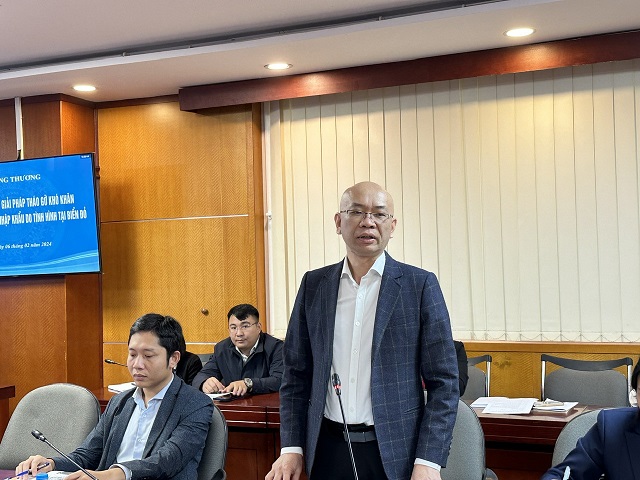The world’s most important maritime artery is being blocked
On February 6, the Ministry of Industry and Trade in collaboration with the Vietnam Maritime Bureau (Ministry of Transport), the Middle East – Africa Department (Ministry of Foreign Affairs) organized a meeting to discuss solutions to resolve difficulties for import and export enterprises due to the situation in the Red Sea.
Mr. Tran Thanh Hai, Deputy Director General of the Department of Import and Export (Ministry of Industry and Trade), said that since the end of 2023, due to conflicts in the Red Sea, many shipping lines have had to change their routes, bypassing the Suez Canal and going around the Cape of Good Hope, making the journey of the ships take 10 to 15 days longer than before.
Along with the limitations on shipping through the Panama Canal due to drought conditions (El Nino), the latest developments in the Red Sea have had a negative impact on the global shipping industry, as well as directly affecting Vietnam’s import and export activities, especially with the European and North American regions.

Mr. Tran Thanh Hai: The potential impact of the Red Sea conflict on Vietnam is significant.
|
In response to the situation, since the end of December 2023, the Ministry of Industry and Trade has issued information documents and recommendations to associations, logistics service providers, as well as import and export enterprises, suggesting some solutions to mitigate the impact of the situation in the Red Sea.
In 2023, Vietnam’s import and export turnover with the European region amounted to 71.14 billion USD and with the North American region amounted to 122.3 billion USD. The total import and export turnover of these two regions accounted for 28.4% of the country’s total import and export value in 2023. Therefore, the potential impact of the Red Sea conflict on Vietnam is significant.
Some immediate negative impacts can be seen such as increased shipping costs, container shortages, extended transit times, and negative effects on meeting import and export orders.
Furthermore, the increased transportation costs and oil prices will create a domino effect on other commodity prices and contribute to economic and geopolitical instability, hindering global economic recovery.
Mr. Truong Van Cam, Vice Chairman and Secretary General of the Vietnam Textile and Apparel Association (VITAS), stated that currently, businesses in the industry are carrying out CIF (Cost, Insurance, and Freight) imports and FOB (Free on Board) exports, so the immediate direct impact is not significant. Because once the orders are signed, production and export enterprises are only responsible for loading the goods onto the vessel. The subsequent processes will be handled by the shipping lines and customers.
However, in case of any risks, there will be a need for sharing, or in other words, customers will request the sellers to share certain costs to minimize losses. Moreover, as there have not been unexpected situations like this before, customers have already requested fast delivery, and when the transit time is extended by 10-15 days, it puts pressure on production enterprises to meet the delivery deadlines.
The most worrying aspect is the uncertainty of when it will end. Mr. Cam suggests that shipping lines should be transparent and provide timely information so that businesses can have appropriate contingency plans in case of any additional fees.

Exported goods facing additional costs
|
Increased costs and delays doubled
Mr. Nguyen Hoai Nam, Deputy Secretary General of the Vietnam Association of Seafood Exporters and Producers (VASEP), revealed that the total cost for shipping one container of goods to the West Coast has increased by 70%, while the cost of transporting frozen goods to Europe has increased nearly fourfold.
Along with the difficulties caused by the decline in export orders, the tensions in the Red Sea have added further challenges for various industries.
Mr. Nam also emphasized the need for more information. In addition, what export enterprises and state management agencies are most concerned about is the cooperation, support, and active participation of shipping lines, which play a crucial role in import and export activities.
“Most shipping lines have redirected their routes through the Cape of Good Hope. In 2023, both import and export goods decreased by 30-40%, which means that shipping lines have all cut back on their main vessels. Combined with the tensions in the Red Sea, the extended transit time from Asia to Europe by 14 days means that delays are doubled,” shared Mr. Nguyen Hoai Nam.
In the agricultural sector, Mrs. Hoang Thi Lien, Chairwoman of the Vietnam Pepper Association and Spices (VPA), revealed that this commodity accounts for 20% of Vietnam’s exports to the EU market.
“Some businesses had loaded their goods onto the vessel since December 20, 2023, but on January 5, 2024, 15 days after the vessel set sail, they were suddenly charged an additional fee of 2,000 USD/40-foot container. The arbitrary application of fees without prior notice, dialogue, or agreement puts exporters in a vulnerable position,” Mrs. Lien recounted and believed that the behavior of shipping lines is not transparent, open, or appropriate.
By Luong Bang




































